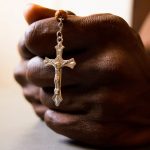Charlie Kirk once said of himself: “I want to be remembered for courage and for my faith. That would be the most important thing.” Those words now stand as his epitaph, not carved in stone but sealed in blood. On a college campus, the very arena he so often entered to proclaim truth against the prevailing winds of ideology, Kirk was struck down by a bullet to the neck. His voice, used for years as a weapon against falsehood, unbelief, and idolatry, was silenced in the most literal way possible. And yet, in a paradox deeply familiar to Christian history, his silencing has only amplified his voice.
A video posted on 𝕏 captures the final exchange before his death. From the audience came the question: “Do you know how many transgender Americans have been mass shooters in the past ten years?” Kirk replied, “Too many.” Pressed further—“Five. Now five is a lot; I’ll give you credit. Do you know how many mass shooters there have been in America over the last ten years?” Kirk then answered, “Counting or not counting gang violence?” At that very instant, in a moment that reads like grim theatre, the assassin’s bullet found its mark.
The irony is chilling. A man warning of violence born of ideological confusion was himself silenced by it. His death unfolded as though to underscore in blood the cultural crisis he had been exposing: when words are no longer tolerated, bullets follow.
To understand the theological meaning of this moment, we must look first to Scripture. St. Stephen, the first Christian martyr, “spoke with wisdom and the Spirit” such that his opponents “could not withstand” him (Acts 6:10). Unable to refute him, they stirred up the mob, brought false charges, and finally stoned him to death. Stephen’s words cut to the heart; his vision of the heavens opened was intolerable to men who could no longer bear the truth.
Kirk’s story is not identical, of course. He was not hauled before the Sanhedrin but stood instead on a modern campus stage. However, the parallel remains unavoidable: a man articulates truth with clarity, perplexing his opponents, while those unable to respond verbally resort to violence. Stephen was stoned; Kirk was shot. Both deaths reveal the same pattern: when speech becomes unbearable for the hardened heart, stones, or bullets, become the only reply.
Christianity has always understood martyrdom as more than death for a cause. It is death for the witness. The word “martyr” itself comes from the Greek for “witness.” The martyr does not merely hold private convictions; he proclaims them publicly, even when the cost is high. Kirk was not an ordained preacher or a bishop; he was a layman, a husband, a father, and an activist. Yet he bore public witness to truths inscribed in both nature and revelation: that life is sacred, that men and women are not interchangeable, for putting America first against foreign interests (and perhaps having healthy skepticism of foreign interests), and first and foremost, that Christ is Lord. For this, he was targeted. For this, he died.
Here René Girard’s insights shed light. René Girard, the French Catholic philosopher and literary critic, became renowned for his theory of mimetic desire and the scapegoat mechanism, which he saw as central to human culture and exposed by the Gospel. Girard argued that human societies, caught in cycles of rivalry and escalating violence, often restore a false peace by choosing a scapegoat, someone accused of disturbing harmony, whose elimination promises order. The scapegoat bears the community’s rage; his death is thought to cleanse society.
Christ revealed the lie of this mechanism. Innocent of all charges, He was nevertheless accused, mocked, scourged, and crucified. By rising from the dead, He exposed the scapegoating process as murder, not justice.
Kirk’s fate fits this same tragic pattern. He was caricatured as a “fascist,” a “hater,” even a “danger to democracy.” His opponents, unwilling to engage his arguments on abortion, family, or gender ideology, instead painted him as an existential threat. Once that lie was accepted, violence could be rationalized as self-defense. The assassin’s rifle, grotesquely engraved with slogans like “Hey fascist! Catch!” and “Bella Ciao,” was not only a weapon but a manifesto. It declared Kirk the scapegoat whose death was meant to appease the crowd.
But as with the martyrs of old, Kirk’s death unmasks the lie. It reveals not his guilt but the corruption of his accusers. It shows that the rage directed at him was never about him personally but about the truths he refused to deny.
Perhaps no words captured this better than those of his widow, Erika. In her extraordinary public address, she declared: “Two days ago, my husband Charlie went to see the face of his Savior and his God . . . Now and for all eternity, he will stand at his Savior’s side wearing the glorious crown of a martyr.”
She went further: “If you thought that my husband’s mission was powerful before, you have no idea what you just unleashed across this entire country. The cries of this widow will echo around the world like a battle cry.”
This is covenantal love transfigured into testimony. It is the theology of martyrdom incarnate in grief and faith. Just as the early Church saw in the blood of martyrs “the seed of Christians” (Tertullian), so Erika discerned in her husband’s death the promise of renewal.
Even secular culture grasps something of this paradox. Obi-Wan Kenobi’s line to Darth Vader: “If you strike me down, I shall become more powerful than you can possibly imagine,” is a pop culture echo of a Christian truth: the silencing of the witness does not end his testimony; it amplifies it.
Kirk’s death, far from silencing him, has drawn the world’s attention more forcefully than any speech he ever gave. His assassination has become a commentary on itself: proof that words still matter, that truth still has power, and that there are forces in our culture that would rather kill than argue.
Unlike President Abraham Lincoln or President John F. Kennedy, Kirk held no public office. Unlike St. Oscar Romero or Blessed Fr. Jerzy Popiełuszko, he wore no clerical collar. He was armed only with words. And it was for words that he died. This is what makes his assassination unique in the annals of American political violence. Presidents are killed because they command armies or sign laws. Across history and cultures, bishops and clergy are killed because they defy tyrants with ecclesial authority. Kirk was killed because he insisted that truth is not negotiable and because he proclaimed it in love, in the service of young people, the future of his country, and countless souls he inspired to embrace Christianity.
This makes his death, in a very real sense, a martyrdom of speech. When words are recast as violence, when disagreement is called “erasure,” then argument itself becomes intolerable. The only “solution” left to the zealot is to silence the speaker. Kirk’s death thus dramatizes the peril of our cultural moment: a society so allergic to truth that it would rather murder the truth-teller than wrestle with his claims.
Yet to understand martyrdom fully, we must remember that it is not only the unjust killing of a witness, but also often includes the awareness of danger, a sober knowledge that truth-telling may invite death.
To speak of Kirk’s death in terms of martyrdom is not to canonize him or to overlook distinctions. Christian martyrdom has always included an element of awareness: the martyrs enter into conflict knowing that their testimony may cost them their lives. St. Stephen saw the stones raised. St. Thomas More mounted the scaffold. St. Oscar Romero stood at the altar knowing his words had made him a target. Kirk, for his part, understood the risks of his mission. He often spoke of the threats he faced on campuses and the hostility directed at him online. Kirk wanted to be remembered for the courage he showed for his faith. He knew the cost of speaking plainly in a culture intoxicated with lies. That he continued anyway marks the essence of witness: not a desire for death, but a willingness to face it rather than deny the truth.
This awareness was underscored powerfully by Robert F. Kennedy Jr., who recently told a packed audience at the Kennedy Center about a conversation he once shared with Kirk. They had spoken of the dangers that come with challenging entrenched interests. When Kirk asked if he feared death, Kennedy replied, “There are worse things than dying—chief among them losing our constitutional rights and condemning our children to slavery.” He recalled telling Kirk that sometimes the only consolation is “to die with our boots on, to die fighting for these things.”
Kennedy concluded: “Charlie gave his life so that the rest of us would not have to suffer those fates worse than death. Now it is our job to rush in, fill the breach, and win this battle for our country, for God, and for our families.” The crowd erupted in chants of “USA!”, testifying to the resonance of Kirk’s sacrifice even beyond those who would normally be counted among his allies. Kennedy’s words remind us that the courage to face death for truth is not reserved for the saints of old, but is demanded anew in our own age, and it is the Church that must now carry this witness forward.
And here the Church must take note. Too often, pastors and bishops have kept silent about abortion, gender ideology, and the disintegration of the family. Too often, they have ceded the cultural battlefield to laymen like Charlie Kirk while remaining mute themselves. His assassination is not only a warning about cultural hatred; it is a summons to the Church.
If lay voices are cut down while clergy remain quiet, then Christ’s words ring true: “If these were silent, the very stones would cry out” (Lk. 19:40). The blood of Kirk, like that of Abel, cries out from the ground. It cries not only against his assassin but against a culture of cowardice that would rather conform than confront.
Charlie Kirk’s death confronts us with the same choice the martyrs have always posed: will we cower, or will we speak? His blood, like theirs, is both rebuke and invitation.
For Catholics, the task is clear. We must remember that martyrdom is not an ancient relic but a present reality. We must draw courage from Kirk’s example, however imperfect, and bear witness in our own lives to truths that the world finds intolerable. And we must echo Erika’s defiant hope: that the mission does not die with the man but lives on with greater force.
In the end, Charlie Kirk’s assassination is more than a political murder. It is a theological signpost. It reveals a society that can no longer bear truth, a culture willing to brand speech as violence and the speaker as a scapegoat. But it also reveals, in the paradox of martyrdom, that the witness of blood is stronger than the silence of death.
Kirk once said he wanted to be remembered for courage and faith. In dying as he lived, he achieved both. His voice, though silenced, has multiplied. His legacy, though contested, will endure. And his death, though tragic, has already become testimony.
Image from Wikimedia Commons

















